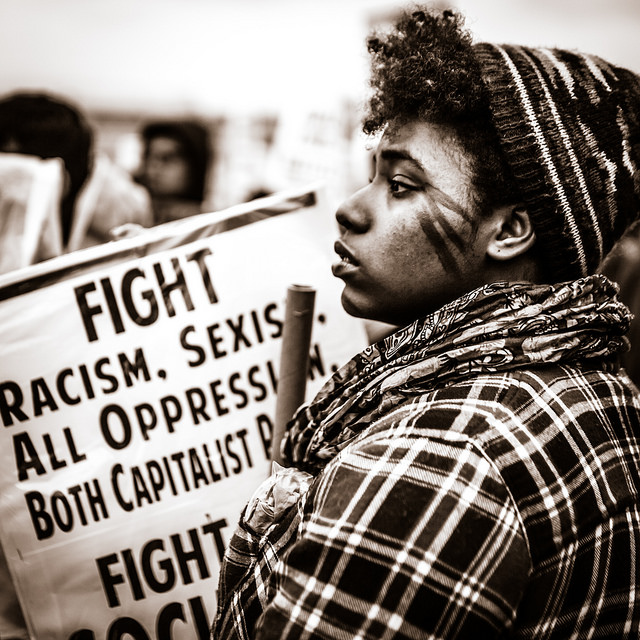“Emotional battle fatigue” is a term I came across while reading a book by Catrice M. Jackson, titled Antagonists, Advocates and Allies and I instantly recognized the symptoms.
They are defined by Smith, Allen, and Danely (2007) as “natural responses to living and working under mundane conditions of heightened distress, especially when facing potential perils or dangers because of tough, violent conditions, or the perception that one’s life, personal dignity, or character is being threatened” (p. 555)
As a woman who exists at the intersection of woman, minority, and single mother to a chronically ill child, I have experienced this on a near daily basis.
In the last few months alone, since the election, I’ve had a number of challenging experiences that I believe are attributed to those factors mentioned. I’ve been told to “watch my tone” by a Dean at a university I previously taught with when I dared speak up for myself (and my students) against a colleague who was shirking his duties.
A Latina student cried after class, sharing her depth of hopelessness over the racism she’s experienced, including people yelling at her to “go back to your own country” while she stood in the rain at a bus stop.
I’ve consoled my children who fear for their refugee and immigrant classmates. I’ve witnessed the onslaught of racially-charged assaults happening around our country. I’ve been slighted and ignored in predominantly white environments, being overlooked or assumed to be the hired help.
I’ve had people enter my office and seem surprised when they ask to speak to the person in charge and discover it’s me.
I’ve been asked to speak for my whole race and have had countless people ask me to educate them on the realities of racism. And when I try, they then accuse me of pulling the “race card” and dismiss my experience entirely.
Just living in this world in brown skin is like constantly wearing a backpack of boulders.
This sh*t is exhausting.
When one feels as through their entire existence is threatened, that experience can be overwhelming. That is exactly why it’s so important to know how to take care of yourself, because as the airlines remind us, when we are traveling with those who need our help, we must first put on our own oxygen masks before we help them with theirs.
Self-care tips:
- Say no. Evaluate your life and the obligations you have and decide which can be let go, set aside, or delayed as you rejuvenate. You may need to reduce your commitment load significantly and that is okay. Those who truly love and support you will understand.
- Rest. Just like recovering from a physical ailment, emotional battle fatigue requires rest. Take naps, eat healthily, meditate, and exercise. Drink lots of water!
- Spend time in safe environments. Although you may have to work in an unsafe place, you can create safety in other places. Find and cultivate friendships with those who are safe and who understand your experience. In those places and with those people, allow your guard to go down and your heart to be healed.
- Take pointed action. Evaluate which actions are most important to you and commit to those. Whether it’s participating in rallies, calling your elected officials, blogging, hosting workshops, or creating social-themed art, use your energy in only those ways which you find most important to you.
- Create strong boundaries. It’s okay to say no to anything that takes from you. If you find yourself drained by an obligation, relationship, or unnecessary activity, let it go. You don’t have to explain or apologize for taking care of yourself.
- Get support. Ask for help from trusted friends. Let the people who care about you support you as you heal. If they offer to bring you food, or take you out, say yes. Let yourself receive.
- Take lessons from battle. In wartime situations, the same soldiers are not always on the front lines. They march in the front and when they are fatigued, they retire to the back of the battalion where they are not in immediate danger and can let their guard down while they recuperate. Recruit a supportive group of fellow social justice warriors and when you feel fatigued, ask someone else to take the front for a while. Recently, I was scheduled to lead a workshop on Becoming an Effective Multicultural Ally at a conference and decided to opt out so I could enjoy spring break with my children and rest. Three of my colleagues stepped in and covered for me and allowed me the space needed to rest and recuperate. That’s exactly how this works.
- Play. Spend time playing and simply enjoying life. I went with my family to a family fun center and spent a whole day playing video games, laser tag, and bowling. We laughed and enjoyed ourselves, and I left feeling happily tired. Letting my inner child out to play was one of the most healing gifts I could have given myself.
This list is by no means exhaustive and it’s not a one-time thing. It is only a small listing of suggestions to support yourself in these trying times.
The battle wages on and as we all know, we are needed. We have important work to do and we need to be okay ourselves to be able to support others. There is no shame in acknowledging you need a break and some support. In fact, it takes great courage to say, “I’m not okay,” and to receive the help that is offered. Part of our commitment to doing healing work in the world is found in doing healing work within.
Be brave. Be bold. Be healed so you can continue to heal the world.
~
Author: Lisa Vallejos
Image: Johnny Silvercloud/Flickr
Editor: Catherine Monkman









Read 0 comments and reply